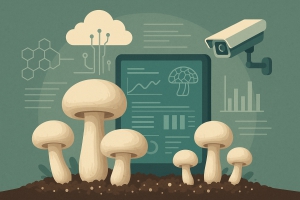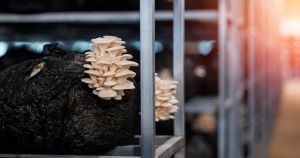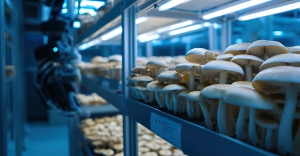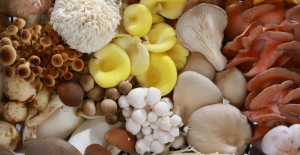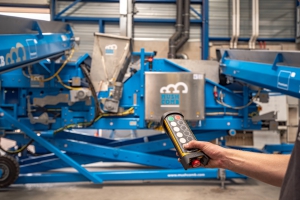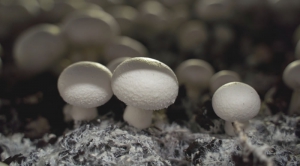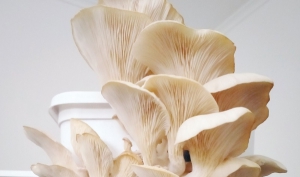The mushroom industry has always been an example of how biology and ingenuity can coexist. What started centuries ago as a craft based on observation, experience, and intuition is now rapidly evolving into a field where data and digital technology drive every decision. The next generation of mushroom farms is taking shape, intelligent, connected, and remarkably sustainable.
Automation becomes accessible
Until recently, automation was something only large farms could afford. Complex climate control systems, robotic picking solutions, and data-driven monitoring platforms were impressive but often out of reach for smaller growers. That landscape is now changing. As technology becomes more affordable and modular, small and mid-sized farms can adopt automation step by step, from simple environmental sensors to cloud-based farm management systems.
These tools help growers maintain stable growing conditions, reduce labor costs, and minimize waste. More importantly, they allow farmers to focus on the art of cultivation, rather than on manual data collection or repetitive control adjustments.
Smarter growing through data
Every mushroom tells a story of temperature, humidity, substrate composition, and microbial balance. By collecting and interpreting this data, growers can now understand their crops better than ever before. Artificial intelligence (AI) is entering the scene, helping to predict yields, identify anomalies early, and even recommend optimal growing cycles.
Imagine a system that learns the behavior of your farm, adjusting CO₂ levels, light exposure, or irrigation based on previous flushes while alerting you to subtle changes that might affect productivity. That’s not science fiction anymore; it’s the emerging reality of smart mushroom cultivation.
The rise of AI-assisted strain development
While climate control and automation enhance the growing environment, artificial intelligence could soon reshape what we grow. AI-assisted strain selection combines genomic data, performance tracking, and environmental inputs to identify which varieties thrive under specific conditions. This opens the door to developing new strains faster, with higher yields, better shelf life, or specific nutritional or medicinal properties.
For mushroom breeders and spawn producers, this digital layer adds precision to what has long been an art form, bridging traditional mycology with computational biology.
Transparency and traceability through blockchain
Consumers today want to know where their food comes from and mushrooms are no exception. Blockchain technology can bring new levels of transparency to the supply chain. From substrate sourcing to post-harvest logistics, each step could be securely logged, offering proof of sustainability, origin, and quality.
For growers, it’s also a way to build trust with buyers and regulatory bodies, simplifying certification and export documentation. In a world where sustainability is not just a value but a requirement, such traceability systems will likely become standard practice.
Sustainability: the core of innovation
At the heart of all this progress is a shared commitment to sustainability. Automation and digitalization are not replacing the grower, they’re empowering them to produce more efficiently, use fewer resources, and reduce waste. From optimizing substrate recipes to recycling heat and water within facilities, smart systems are helping farms close the loop.
The mushroom sector has always been a pioneer in circular agriculture. Now, by integrating technology, it is showing that environmental responsibility and innovation can grow side by side.
A future rooted in tradition and technology
The message is clear: the future of mushroom farming is intelligent, data-driven, and sustainable. Yet the essence of the craft remains unchanged, understanding living organisms and creating the conditions for them to thrive. By combining centuries-old cultivation wisdom with 21st-century technology, the mushroom industry continues to prove that innovation grows best on a fertile foundation.
Published by Mushroom Matter: connecting the global mushroom community through insight, innovation, and inspiration
As the mushroom industry continues to evolve, one of the most exciting frontiers is happening beneath the surface, literally. The development of smarter, more sustainable substrates is redefining how mushrooms are cultivated, improving efficiency, productivity, and environmental impact all at once.
The hidden power of the substrate
Every mushroom farmer knows that success begins with the substrate. It’s not just a growing medium, it’s the foundation of the entire production process. Traditionally made from agricultural by-products such as straw, manure, or sawdust, substrates are now being optimized through a combination of science and technology.
Researchers and commercial producers alike are exploring new blends that enhance nutrient availability, moisture retention, and microbial balance. These improvements allow mushrooms to grow faster, stronger, and with more consistent quality across flushes.
Data meets biology
Technology is playing a crucial role in unlocking the full potential of substrate science. Precision monitoring tools, AI-driven analysis, and smart sensors are allowing farmers to better understand what’s happening at the microbial level.
By analyzing temperature profiles, CO₂ emissions, and biological activity in real time, growers can fine-tune conditions to ensure optimal colonization and fruiting. This data-driven approach helps reduce energy costs, minimize contamination, and ultimately increase yields, all while maintaining product quality.
Sustainability from start to finish
The move toward sustainable substrates reflects a broader shift in the mushroom industry toward circularity. Agricultural waste streams, such as coffee grounds, brewery grains, and nut shells, are being repurposed as feedstock for mushroom cultivation.
After harvesting, spent mushroom substrate (SMS) is being given new life as compost, animal feed, or soil enhancer, closing the loop in a truly regenerative production model. This approach not only reduces environmental impact but also creates added value from every stage of the cultivation cycle.
Growing smarter, not harder
As consumer demand for mushrooms and functional fungi continues to rise, the industry’s ability to innovate from the ground up will define its future. The next generation of substrates, designed with precision, sustainability, and circularity in mind, will help growers meet global demand efficiently and responsibly.
In the world of mushrooms, it’s clear that what happens beneath the surface can make all the difference above it.
Published by Mushroom Matter: connecting the global mushroom community through insight, innovation, and inspiration
The mushroom industry is entering a digital era. What was once guided solely by intuition, experience, and manual labor is now increasingly supported by sensors, automation, and data analytics. From substrate preparation to harvest, smart farming tools are reshaping how fungi are grown, making production more precise, efficient, and sustainable than ever before.
Precision growing in every layer
Inside modern growing rooms, environmental control systems are evolving into intelligent ecosystems. Sensors monitor temperature, humidity, CO₂ levels, and air circulation in real time. Artificial intelligence (AI) algorithms then adjust these factors automatically, ensuring ideal conditions for each growth phase.
This precision doesn’t just boost yields, it reduces energy consumption and minimizes human error. Instead of reacting to issues after they occur, farmers can anticipate and prevent them, achieving higher consistency and quality across crops.
Data as the new substrate
For decades, mushroom cultivation relied heavily on experience, the grower’s eye and intuition. Those remain invaluable, but now they’re being amplified by data. Smart platforms can collect thousands of data points per day, translating them into actionable insights: when to ventilate, irrigate, or adjust temperature.
Some farms use cloud-based dashboards that visualize performance across different growing rooms or even multiple sites. Others are experimenting with machine learning to recognize growth patterns and predict harvest times with remarkable accuracy.
In short, the farm is learning, and so are the fungi.
Automation lightens the load
Labor shortages have long been a concern in the mushroom sector. Smart technologies are helping to bridge that gap. Automated systems can handle repetitive or heavy tasks such as substrate loading, climate adjustments, or even mushroom picking with robotic precision.
While full automation isn’t feasible for every operation, even partial adoption, for example, using camera-guided monitoring or automated watering, significantly reduces workload while improving consistency. The result: growers can focus more on strategy, quality, and innovation instead of routine maintenance.
A sustainable shift
Beyond efficiency, smart farming supports a more sustainable production model. By fine-tuning environmental parameters, farms use less energy and water. Precise climate control minimizes waste, and optimized substrate management helps reduce contamination rates.
For forward-thinking producers, data also helps demonstrate sustainability performance to customers and investors, turning eco-efficiency into a measurable, marketable advantage.
The human touch remains
Even in the smartest farms, technology doesn’t replace people, it empowers them. Successful growers combine digital insights with hands-on experience and instinct. The art of mushroom cultivation remains rooted in understanding living organisms; technology simply provides new tools to nurture them better.
The road ahead
Smart farming in mushrooms is still in its early stages, but the direction is clear. With each innovation, whether AI-driven control, autonomous harvesters, or cloud-based analytics. the boundary between biology and technology grows thinner.
As these systems become more accessible and affordable, farms of all sizes can benefit from the data revolution. The result? Smarter farms, smarter fungi, and a more resilient, sustainable future for the entire mushroom industry.
Published by Mushroom Matter: connecting the global mushroom community through insight, innovation, and inspiration
The mushroom sector is entering a transformative phase, where farming tradition meets cutting-edge innovation. Once seen simply as a niche crop, mushrooms are now emerging as powerful contributors to sustainable agriculture, human wellness, and even material science.
Shaping a circular food system
One of mushrooms’ greatest strengths lies in their resource efficiency. Unlike many crops, they flourish on byproducts such as straw, sawdust, or coffee grounds, making them natural allies in the shift toward circular farming. For growers, this opens opportunities to reduce waste, diversify substrates, and partner with other agricultural industries to create closed-loop systems.
Health on the rise
Consumer interest in functional and nutrient-rich foods continues to surge, and mushrooms are at the forefront. Varieties like Lion’s Mane and Reishi are valued for their adaptogenic potential, while everyday favorites such as oyster and button mushrooms are being recognized for their protein, fiber, and vitamin D. This dual reputation, both as staple food and functional ingredient, is fueling new product development across the food and supplement industries.
Farming smarter with technology
The drive toward efficiency and scalability has accelerated adoption of digital tools. Automated climate systems, AI-based monitoring, and sensor-driven data analytics are helping growers fine-tune production while tackling labor shortages. Farms that embrace these technologies are finding new ways to improve yields, cut costs, and meet rising demand with consistency.
Beyond the plate
Mushrooms are increasingly breaking into non-food markets. Mycelium, the root-like structure of fungi, is now being used to create biodegradable packaging, sustainable textiles, and even construction materials. These developments highlight the mushroom industry’s potential to play a role far beyond food, positioning it as a cornerstone of sustainable innovation.
Building a future-ready industry
As mushrooms gain attention worldwide, the industry faces both opportunity and responsibility. Growth must balance innovation with sustainability, ensuring practices that protect natural resources while meeting expanding consumer expectations. Collaboration between farmers, researchers, and entrepreneurs will be vital in keeping the sector resilient.
Mushrooms today are not only a crop but a vision of what agriculture and innovation can achieve together. For farmers and industry leaders, the message is clear: cultivating mushrooms means cultivating the future.
In the following weeks we'll dive deeper into theses subjects. Do you have expertise, research or success stories on these subjects that can inspire others? Reach out and let’s share your voice with our readers!
Published by Mushroom Matter: connecting the global mushroom community through insight, innovation, and inspiration
A TEESSIDER is Britain’s new karting king – less than three years after taking up the sport.
Middlesbrough’s Hassan Zafar was crowned British Indoor Karting Champion, beating over 5,000 competitors to the title.
The achievement is even more remarkable given Hassan’s first time behind the wheel came at the end of 2021 when he visited the TeamSport track in Stockton.
Now the 21-year-old has found himself in pole position for further glory after securing a tasty sponsorship deal with a firm determined to help make the sport a bit greener.
“I visited TeamSport’s indoor track in Portrak Lane for a bit of fun and never in my wildest dreams did I think that three years later I’d be British champion,” said Hassan, from Normanby. “A few months after my visit I realised that I was actually pretty good. TeamSport had a membership session where I could race against better drivers, and competing against them really brought the best out of me. “Everything has since just snowballed to the point where I was competing at an incredibly high level – and winning. “I’m absolutely over the moon, it was a genuinely amazing feeling when I realised I’d won it and the buzz I get from karting is out of this world.” And despite karting’s gas-guzzling reputation, Hassan has secured a major sponsorship with a company determined to tackle global warming.
Plant-based manufacturer Myco is the brains behind a pioneering protein called Hooba. The oyster mushroom-based protein is crafted using one of the most sustainable production methods in the food industry – leading to their quarter pounder being dubbed ‘Britain’s Greenest Burger’. For Hassan, who often eats a vegan-friendly diet, the North Yorkshire food firm is helping to fuel his rise in the rankings – while the firm’s CEO, David Wood, is keen to help develop the sport. “Karting, and motor racing in general, has never had a great reputation for sustainability but that’s definitely starting to change,” added David. “At TeamSport, where Hassan learned his craft, the business has really pushed the environmental envelope by converting some of their tracks to cater for electric vehicles and that’s the sort of innovative approach that has attracted us to get involved in karting. “At Myco, our approach is also driven by innovation – our production site is the most unique in the UK and we are focused on working with the meat industry, not against it – to find sustainable solutions to lowering meat consumption and tackling the climate crisis. “That’s why we are so thrilled to support Hassan.”
For more information on Myco and Hooba, please visit their website.
Source: Myco
Peat-free casing soils for mushroom cultivation
- Mushroom growers fear for their existence and researchers are looking for environmentally friendly alternatives. You can watch the episode here.
-
Ms. Natalie Rangno (IHD Dresden) on the development and practical testing of peat-free casing soils as part of the MykoDeck project. You can watch the episode here.
For more information about this project, click here.
Mushroom growers are known as the “ultimate recyclers” in the agriculture industry, using byproducts and waste from other sectors to make compost. Through the recycling of agricultural crops and byproducts, mushroom farms have a smaller environmental footprint than almost any other agricultural operation.
At Mush Comb, we are committed to a sustainable world. We contribute by manufacturing customized machinery. We understand that each mushroom business is unique, with its own set of needs and challenges. That's why we offer more than just standardized machinery. We have delivered machines to over 50 countries and have satisfied customers worldwide.
Our team works closely with you to design and develop machinery that seamlessly integrates into your operations, optimizing efficiency and productivity. Whether you're a small producer or a commercial operation, our customized solutions are tailored to meet your specific requirements. We provide full project consultancy, installation, maintenance, and support for our machines.
Visit our website or contact us at +31 (0)77 398 3929 or This email address is being protected from spambots. You need JavaScript enabled to view it. to learn more about our services.
‘fungi stool’ BY satoshi itasaka
In an effort to learn more about natural decomposers such as fungi and bacteria, Japanese designer Satoshi Itasaka unveils the ‘Fungi Stool’. As its title suggests, the stainless steel and wood stool is composed of fungi that grow and bloom, like flowers, into mushrooms.
‘It is no exaggeration to say that the cycles of nature are carried out by bacteria and fungi,’ Itasaka notes. ‘Bacteria and fungi have been the decomposers in the food chain keeping the earth’s environment in a healthy state. They are the ones we should follow for we are constantly putting a burden on the earth in terms of the global environment.’
Preserving fungi decomposers
Satoshi Itasaka’s Fungi Stool highlights the importance of preserving fungi decomposers as they play a crucial role in our ecosystem. It also proposes a more sustainable direction to furniture design. Its seat is made up of a circle of six discs that somewhat resemble mushroom caps huddled next to each other.
‘There are about 100 trillion bacteria in our bodies’, the product designer explains. ‘Therefore, we live in symbiosis with about three times as many bacteria as our own cells. Although we are sometimes tormented by bacteria, the environment in which we live would not be possible without decomposers such as fungi and bacteria. The world is in the midst of a sanitization boom, but I designed a device to learn more about these decomposers, not to get rid of them. I found that the fungi grew unexpectedly in that apparatus. The fungi grew and blossomed like flowers, producing numerous beautiful mushrooms.’
Source: Designboom
Mushroom Life Cycle Assessment
Gentle on the Planet
Stakeholders across the food product supply chain are increasingly interested in understanding the environmental effects of food production. Mushrooms have a unique growing process unlike any other produce item and are considered “one of the most sustainably produced foods in the United States1.” Consider this:
- They are grown in the absence of sunlight in a climate-controlled environment.1
- One pound of production requires only 1.8 gallons of water; 1.0 kilowatt hours of energy; generates only .7 pounds of CO2 equivalent emissions.1
- Up to 1 million pounds produced on just 1 acre.1
A 2018 study2 published in the International Journal of Life Cycle Assessment looked at the cradle-to-gate life cycle environmental impacts of mushroom production in the United States from cultivation to harvest and preparation for bulk packaging. The goal was to create a “baseline” estimate of energy use, global warming potential (GWP), water use, and other common environmental impacts.
Please read the full article here.
A Gisborne entrepreneur will soon open the region’s first “zero waste, grow your own mushroom” business that focuses on reusing waste products.
Mariska Van Gaalen is the founder of Mushroom Zero Waste an initiative that reuses plastic containers and waste materials to grow mushrooms in a sustainable way.
She says that for her to start a business meant being responsible for the entire life cycle of the product, and avoiding the production of any additional waste.
Ms Van Gaalen uses plastic containers collected from a restaurant to hold unused wooden shavings, coffee grounds and mycelium — the fungus — to grow native oyster mushrooms.
Please read the full article here.
Source: Gisborneherald, by Avneesh Vincent














